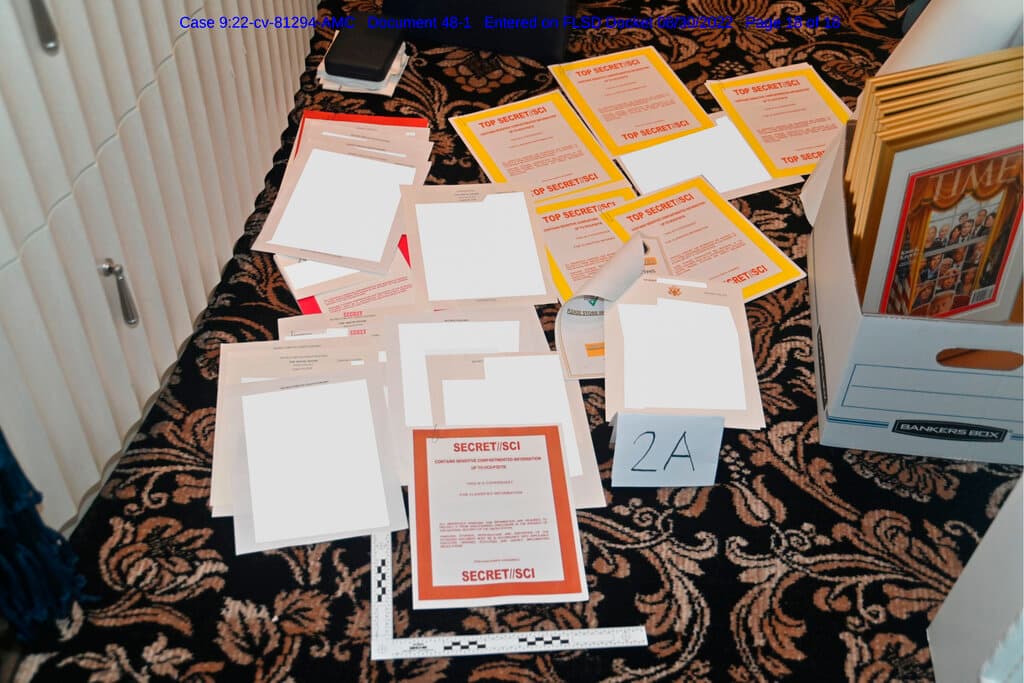Secrets of the Press
Is it logical for the press to wheel on President Trump for allegedly holding classified documents in a way that might be a violation of the same Espionage Act under which the press’s celebrated sources were, or still are, in jeopardy?

The prospect that the Justice Department has discovered at Mar-a-Lago classified documents not supposed to be there certainly has thrown the titans of the press into a swivet. The Times is out with an editorial about how if President Trump has broken the law the Feds “must seek an indictment.” The Washington Post rails against his refusal “to hand over any additional classified information despite a grand jury subpoena.”
One has to pinch oneself to remember that the Times and the Post brought us, via Daniel Ellsberg, the Pentagon Papers, after defying the government’s request for the return of the purloined papyruses. Hollywood a few years back brought out a drama — starring Meryl Streep and Tom Hanks — glorifying the Post for disclosing these secrets, never mind the risks to our war effort of which the government was warning.
We seem to recall that, in 2006, President George W. Bush begged the Times not to disclose America’s surveillance of the SWIFT banking system, only to be told to take a hike by the Times publisher, Arthur Sulzberger Jr. The Times, in a decision that shocked us at the time, went ahead and published anyhow, infuriating the commander-in-chief of America at a time when, again, we had troops in combat.
“The disclosure of this program is disgraceful,” Mr. Bush said. “We’re at war with a bunch of people who want to hurt the United States of America, and for people to leak that program, and for a newspaper to publish it, does great harm to the United States of America.” Where were the editorials calling for the publisher to be prosecuted? Instead, the Times was cleared by a special master — pardon — its own “public editor.”*
Then, too, there is Private Manning of the United States Army, who pleaded guilty to downloading thousands of secret documents in respect of the wars in Iraq and Afghanistan, as well as confidential cables. Private Manning passed a trove of material to Wikileaks, which turned around and went into what effectively was a partnership with the Times and another distinguished paper, the Guardian, to publish much of it.
Then there’s the case of the former contractor of the National Security Agency, Edward Snowden, who leaked a trove of secrets to several journalists. The secrets then fetched up in the Guardian and the Washington Post, which had a field day with them and ended up winning the Pulitzer gold medal for public service. Mr. Snowden has fled to Russia, preferring to live under Vladimir Putin rather than trust the courts in his own country.
The major sources in these yarns are, or were, accused of violating the Espionage Act. Private Manning in 2013 went to prison, only to have a 35-year sentence commuted in 2017 by President Obama. The case against Mr. Ellsberg foundered over government wrongdoing. Mr. Snowden, and Wikileaks’ Julian Assange are still wanted. They must be presumed innocent, but if found guilty, would be in real trouble.
Here is the question: Is it logical for the press to wheel on President Trump for allegedly holding at his post-presidential compound classified documents in a way that might be a violation of the same Espionage Act under which the press’s celebrated sources were, or still are, in jeopardy? And without knowing Mr. Trump’s intent or the content of the documents? Mr. Trump is, after all, covered by the same First Amendment as everyone else.
We don’t ask these questions lightly. We think of ourselves as First Amendment radicals. We don’t dislike the New York Times, the Washington Post, or the Guardian. We’ve read them every day for our entire adult lives. By what we are shocked is the hypocrisy, the rank politicization, and the lack of self-awareness on the part of the press. And its double-standard when it comes to the law. It’s one of the biggest stories of our time.
_______
* The Times’ public editor at the time, Byron Calame, is a magnificent newspaperman, a veteran of the Wall Street Journal and the United States Navy. He later reversed his own opinion on the SWIFT story, saying “I don’t think the article should have been published.”

